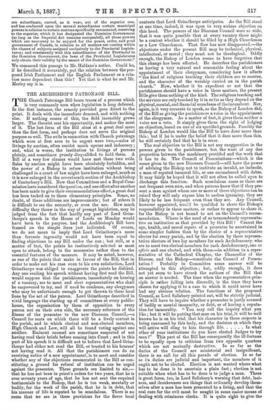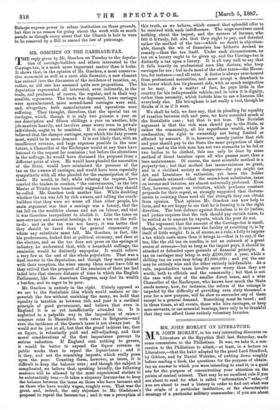THE ARCHBISHOP'S PATRONAGE BILL.
THE Church Patronage Bill bears traces of a process which is very commonly seen when legislation is long deferred. In the first instance, the remedy provided goes direct to the point. It deals with the immediate demand, and with nothing else. If nothing comes of this, the field insensibly grows larger. The theorist sees his opportunity, and makes the most of it. The last form of the Bill aims at a great deal more than the first form, and perhaps does not serve the original purpose so well. The evils in connection with Church patronage which were at first seen to be urgent were two,—sales of livings by auction, often amidst much uproar and indecency ; and, what is worse, the institution to livings of persons plainly, and sometimes grossly disqualified to hold them. A Bill of a very few clauses would have met these two evils. Sales by auction might have been absolutely forbidden, and the power of a Bishop to refuse institution without being challenged in a court of law might have been enlarged, much as it is now enlarged in the seventeenth section of the Archbishop of Canterbury's Bill. Now that Committees and a Royal Com- mission have considered the question, and one effort after another has been made to give their recommendations effect,a great deal has been tacked on to these elementary principles. Some, no doubt, of these additions are improvements ; but of others it is difficult to see the necessity, or even the use. How much difficulty they throw in the way of prompt legislation, may be judged from the fact that hardly any part of Lord Grim- thorpe's speech in the House of Lords on Monday would have been to the purpose, had the Archbishop's Bill been framed on the simple lines just indicated. Of course, we do not mean to imply that Lord Grimthorpe 's more than forensic ingenuity would not have been equal to finding objections to any Bill under the sun ; but still, as a matter of fact, the points he instinctively sele3ted as most open to attack, belong to the accessories rather than to the essential features of the measure. It may be noted, however, as one of the points that make in favour of the Bill, that in order to make out his case even to his own satisfaction, Lord Grimthorpe was obliged to exaggerate the points he disliked. Any one reading his speech without having first read the Bill, would suppose that the parishioners, immediately on hearing of a vacancy, are to meet and elect representatives who shall be empowered to try, and if need be condemn, any clergyman who may be unfortunate enough to get thrown to these local lions by the act of the patron. Lord Grimthorpe described in vivid language the starting up of committees at every public- house, the organisation by them of opposition to every person not on their own side, the necessary reference of the fitness of the presentee to the new Diocesan Council,—a Council for seats on which there will be a lively contest in the parish, and in which clerical and non-clerical members, High Church and Low, will all be found voting against one another. Eminent counsel are sometimes suspected of not having read their briefs before coming into Court ; and in this part of his speech it is difficult not to believe that Lord Grim- thorpe had either not read the Bill, or trusted to his hearers' not baring read it. All that the parishioners can do on receiving notice of a new appointment, is to meet and consider whether any of the objections enumerated in the Bill as con- stituting a ground for refusal of institution can be urged against the presentee. These grounds are limited to six,— that he has not been in priest's orders for two years, that he is over seventy years of age, that he has not sent the required testimonials to the Bishop, that he is too weak, mentally or bodily, for the work of the parish, that he is in debt, that his manner of life is reputed to be scandalous. There is no room that we see in these provisions for the fierce local contests that Lord Grimthorpe anticipates. As the Bill stood at one time, indeed, it was open to very serious objection on this head. The powers of the Diocesan Council were so wide, that it was quite possible that at every vacancy there might be a contest whether it should be filled by a High Churchman or a Low Churchman. That flaw has now disappeared,—the objections under the present Bill may be technical, physical, intellectual, or moral ; they must not be theological. Oddly enough, the Bishop of London seems to have forgotten that this change has been effected. He describes the parishioners as having a very natural and reasonable feeling about the appointment of their clergyman, considering how it affects the kind of religious teaching their children are to receive, and the character of the worship carried on in the parish church." Now, whether it be expedient or not that the parishioners should have a voice in these matters, the present Bills give them nothing of the kind. The religious teaching and the services are only touched by it in so far as they depend on the physical, mental, and financial soundness of the incumbent. Nor, again, is it very accurate to speak, as the Bishop of London did, of the Bill as giving the parishioners a voice in the appointment of the clergyman. As a matter of fact, it gives them neither a voice nor a veto. It simply gives them the right of lodging an objection, based on one of six specified grounds. Possibly the Bishop of London would like the Bill to have done more than this ; but if he is under the belief that it does more than this, he will certainly find that he is in error.
The real objection to the Bill is not any exaggeration in the powers given to the parishioners, but the want of any due proportion between the machinery provided and the work that it has to do. The Council of Presentations—which is the name given to the new Diocesan Council—will have the power of advising the Bishop not to institute an invalid, an imbecile, a man of reputed immoral life, or one encumbered with debts. It may fairly be hoped that it will not often be called upon to discharge this function. Such scandalous cases as these are not frequent even now, and when patrons know that if they pre- sent a man against whom one or more of these objections can be raised they will only expose him to useless ignominy, they are likely to be less frequent even than they are. Any Council, however appointed, would be qualified to share the Bishop's responsibility in these matters, or rather to appear to share it, for the Bishop is not bound to act on the Council's recom- mendation. Where is the need of so tremendously representa- tive an institution as that provided by this Bill ? Cannot the age, health, and moral repute of a presentee be ascertained in some simpler fashion than by the choice of a representative elector for every parish, and by the election by these represen- tative electors of two lay members for each Archdeaconry, who are to meet two clerical members for each Archdeaconry, one ex officio and one elected, and with them—in addition to a repre- sentative of the Cathedral Chapter, the Chancellor of the Diocese, and the Bishop—constitute the Council of Presen- tation V Probably in Committee some answer will be attempted to this objection ; but, oddly enough, it does not yet seem to have struck the authors of the Bill that an answer is needed. The time when the representative prin- ciple is rather falling into discredit, is the time they have chosen for applying it to a case to which it could never have had any obvious relation. The functions of the proposed Council, as Lord Salisbury pointed out, will be strictly judicial. They will have to inquire whether a presentee is justly accused of bodily or mental incapacity, or debt, or of having a reputa- tion for immorality. "You may call the inquiry what you like; but it will be putting that man on his trial, it will be well known he is on his trial, that his character in these respects is being canvassed by this body, and the decision at which they will arrive will cling to him through life In what other of your institutions do you have elected Judges to try men I" This part of the Bill has consequently the ill-fortune to be equally open to criticism from two opposite quarters which are not mutually destructive. In so far as the duties of the Council are ministerial and insignificant, there is no call for all this parade of election. In so far as its duties are judicial and important, the members of it ought not to be elected. Election is not wanted where what has to be done is to ascertain a plain fact ; election is not suitable when what has to be done is to judge a man. There is great force, too, in Lord Salisbury's warning that debt, lazi- ness, and drunkenness are things that ordinarily develop them- selves after a man has been presented to a living, and that the real cure for the evil must be sought in some easier means of dealing with criminous clerks. It is quite right to give the
Bishops express power to refuse institution on these grounds, but that is no reason for going about the work with as much parade as though every abuse that the Church is heir to were to be removed by a Bill to amend the law of patronage.



































 Previous page
Previous page